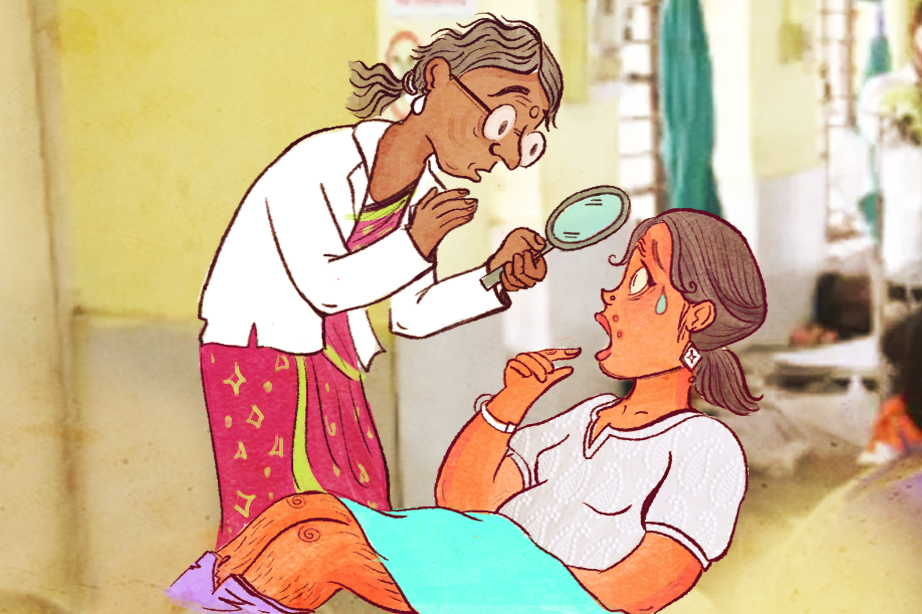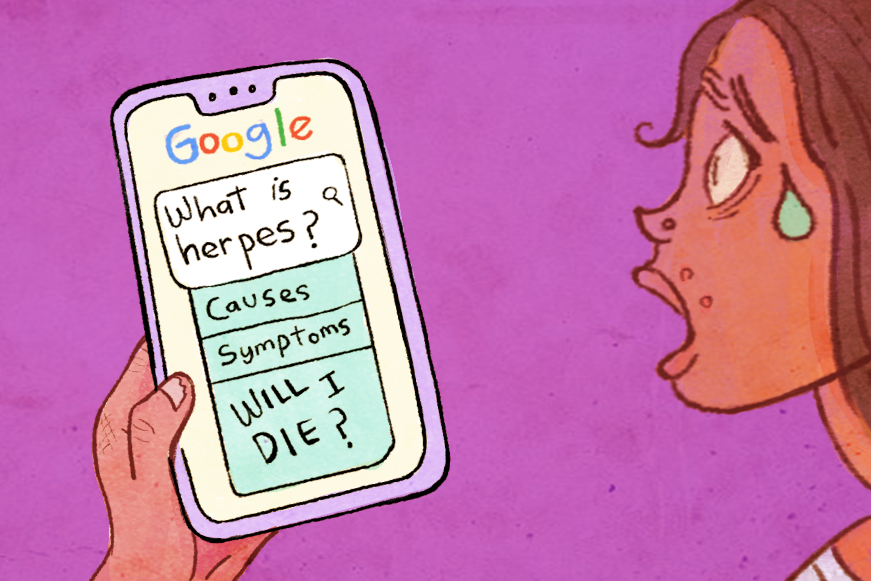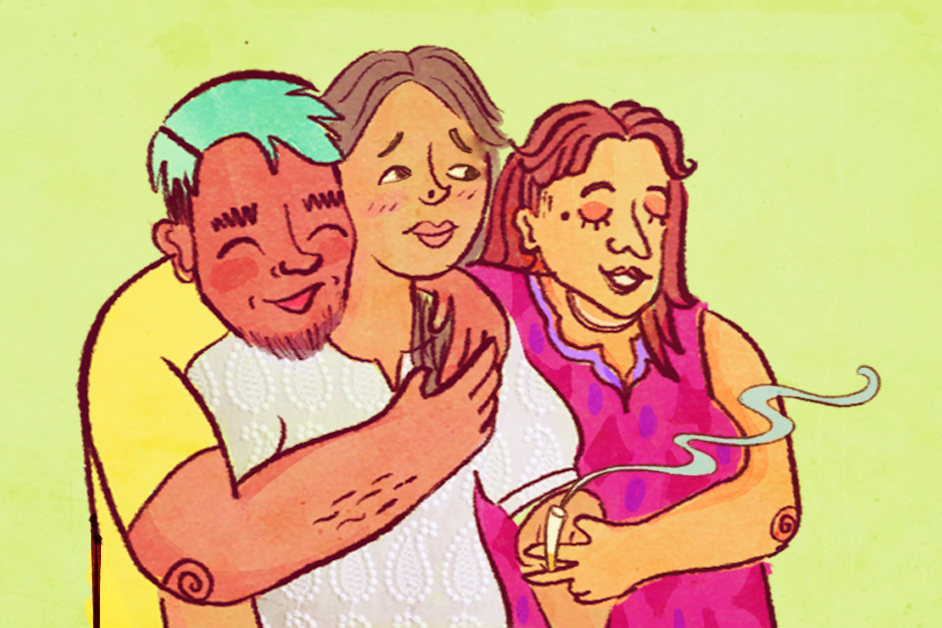A little while ago, I went to the gynaecologist about a rash on my privates that I’d had for about half a week. It was so itchy and odd, I toh just thought it was a yeast infection jo thoda zyada khujli karke rash ban gaya, that it would be okay with some simple medication.
My aunt came along with me, quite a normal phenomenon in my family–being accompanied to visit the doctor. My maasi explained that this was one of the best gynaecologists in Gurgaon, and her clinic was near by, so off we went. I spoke to the doctor for a few minutes, explained to her what the problem was, then went to the examination room next door. She put on her gloves and mask, then glanced at my coochie, and back at me. She then asked if I was sexually active, nice enough to ask me away from my maasi.
I told her that I was, though the last time I partook in any sexual activity was a few weeks ago, and never usually continuously with the same partner. Single as a pringle wale din chal rahe the. She looked down again, then at my face, looked right into my eyes and said the words, “This is looking like herpes to me.”

There was an instant dhol banging in my head and a hundred thoughts conducting a fast-forward march past from my brain to my face in the moments after she said that. The only word that could come out of my mouth was, “Wh- wh- what?” and I think she could see the panic that had settled between my eyebrows, crinkling my nose, disallowing the words to come out of my mouth.
She said, “This is most definitely herpes, this is usually how herpes lesions look,” and then she asked about the two pimples (or pimple-seeming bumps) on my upper lip. The coochie rash and the upper lip pimple had actually started to come up around the same time, now that I thought about it, and that’s what I told her.
I had to calm down because, well, I was sitting there with my pants down with a likely look of abject horror on my face, wondering where it came from and who gave it to me. I think these are the first questions a person asks themselves when they find out something like this.
We went back to sit in her cabin, and she wrote down on my prescription, “herpes genitalia & herpes labialis” above the short list of medicines she wrote down. My maasi read as she wrote the diagnosis and the name of the antiviral tablet (Acyclovir), the antiviral ointment I was to use (called “Herpex 5%”), and the two blood tests I was to take to figure out the type of herpes I had (IgG and IgM HSV) but she didn’t say anything to me then.
I wanted to get out of there and back home as quickly as I could, so I could be angry, sad, and ashamed alone with my own tears, and my maasi seemed to understand that, too.
Walking to the market to buy the meds before heading home, she said to me, “Tuk herpes hoise?” which is Assamese for “You’ve got herpes?” I told her, yes, seeming like it. She told me, “It’s okay, babu, it will be fine. It’s not a big deal. What can you do now?”
I was grateful that she was not angry at me, because an STD diagnosis would be enough to anger any member of an Indian family, but this gratitude and relief was overpowered by my inability to speak at that moment. All I could say was, and I said it a few times, “I can’t believe this has happened. How could this have happened?”
I couldn’t sleep that night, because every time I would try to shut my eyes, my hands would go back to my phone, to incognito mode on my phone to read more and more about HSV (herpes simplex virus). That night, ridden with panic and guilt and shame, I learnt about the different types of herpes in terms of HSV1 and HSV2, and how that’s different from the typology of genital herpes and cold sores.

Both types are prevalent, but can be differentiated by how frequent the flare-ups are and where the flare-ups occur. Type 1 (HSV-1) usually spreads by oral contact and causes infections in or around the mouth (oral herpes or cold sores). It can also cause genital herpes. Type 2 (HSV-2) spreads by sexual contact and causes genital herpes. HSV-2 usually sees multiple flare-ups a year, but HSV-1 is less frequent. Of course, this differs for each person.
I learnt about herpes transmission: that it can take between 10 days to 10 years to manifest after you have been exposed to it. I also learnt that the flare-ups, or the cold sores, lesions, whatever you want to call them–it all comes and goes, but that the disease is lifelong, that it cannot be cured but it can be managed and treated when flare-ups happen. Flare-ups usually last about 7-10 days, but it’s safer to take it as 15 days. Giving it a few days after the lesions have disappeared before doing any sexy things with someone is a good idea. Your partner and you can then both be more comfortable being fully sure it’s not passed on.
I spent some time on my haunches in my loo, staring at my own vagina with a small mirror and the flashlight of my phone to examine what exactly it was that was happening to me. What are these stupid little lesions that have my mental health and sleep cycle all over the place? I freaked myself out reading up about it late into the night, until I stumbled upon three things I found incredibly helpful:
1. A handbook on the disease to understand how to cope and live a normal life once you have it.
2. Statistics on how prevalent it is (and it is very prevalent, mind you), and,
3. The last, but most helpful, a Buzzfeed list of celebs that have been spotted with cold sores at some or another point in time. That list included Brad Pitt, Lady Gaga, Victoria Beckham, and so many others.
Oh, this felt especially good, to know that famous people struggle with something like this, too, and so I am truly not alone.
And then I could finally go to sleep... that night.
Some of the thoughts that were consuming me the consequent sleepless nights were about the stigma associated with STDs, about whether or not I could share food and drinks and ciggies with my friends and family anymore, about if anyone would ever want to sleep with me or date me again knowing that I have this disease (even though it is not necessarily transmissible if there isn’t an active flare up).
What angered me greatly during the first few weeks was not knowing where it came from. I speculated that it may have been the last guy I was with, and it killed me a little bit every time I thought about his face. It was more the inability to remember whether or not there was anything on his lip that I should’ve noticed, it is this blank space in my memory where his mouth was that added lines to my forehead on most nights.
I was also trying very hard to figure out how I was going to tell anyone about it, until one fine day I called up a friend crying amidst a terrible bout of anxiety about it in the middle of the day. She listened to me and then told me that I was not even the first person to tell her that they have herpes, that it’s super common and nothing to break my head over, but that she understood why I was freaking out in the first place.
When I asked her how I was supposed to break this to men I intend to get jiggy with, she said these words to me that I will never forget: “You have never given a f*ck what people think of you and that is who you are. Why do you give a f*ck now?” and to tell you the truth, I think that’s the kind of tough love I needed at that point, because it jolted me back to who I am instead of the timid shell that I had become for that little while.
I began to tell my close friends soon after that conversation, the ones that I usually share my food with at college, that I have this problem and that we have to be a little careful about it. I was worried at first, but it was a futile concern at that point because I have found out that the people I have surrounded myself with now are the most wonderful and the most loving friends I could ask for. I thought, for some reason, that it would be funny to them, or that they would think I’m gross and would want to stay away from me, but the love they threw my way when I told them about it was absent of judgement, ridicule, and pity, and it made me feel ever so grateful and relieved, once again.
The difficult one was when I had to tell a boy that I had met multiple times before that I have been diagnosed with herpes. It was a phone conversation and it took a lot out of me to even dial his number to have that conversation.
I felt heavy and sad about it afterward because, of course, he wanted nothing to do with me after that. I asked him to get himself tested, too, just in case. This was the experience that had filled my mind with these obtuse thoughts that nobody is going to want to be with me anymore. It was so difficult to come to terms with this, and I understand why now – because it simply isn’t true.
I got into a relationship with someone who knew about my condition; he was a friend first. He told me he loved me, we had wonderful and very safe sex, until I had a flare-up on my upper lip again and then I couldn’t come close to him for two weeks, though I saw him every day. The day it was safe to kiss him after those two weeks, well, you know what happened then.
More than that, I was petrified of my mother finding out, not because she would be angry at me or that she would find out I’m sexually active—she already knows that. More because I don’t want to answer the follow-up questions that come with it.
This is more of a personal experience because of my relationship with my mother, but she did find out because she saw my prescription by chance, but when I told her I didn’t want to talk about it, she let it go. All she asked was, “but are you okay??” on a text message. and it only showed me how much love I am surrounded with.
Today, I am a lot more comfortable talking about herpes because I am now able to recognise that it is common and not such a big deal, even though it seemed catastrophically life-changing at first. Of course, I’m not comfortable enough to put this out there with my name on it—they’re called baby steps. But I have had multiple flare-ups and I am learning to manage it better. I’ll tell you this—as someone who has herpes, if you have it, if you develop it at some point, it’s your responsibility to keep your loved ones safe, as hard as that is to accept. My friends happily offer me drags from their cigarettes or a bite of their food, and I have to remind them that they’re not supposed to do that for a few days.
What I’m arriving at is that having an STD isn’t the end of the world. It feels as though you will be shunned by the people around you and it is something for which we must feel great shame, because it is sexually transmitted and anything to do with sex and pleasure is generally frowned upon by society. But it is not the end of the world. At first, things come crashing down, but know that there is an end to that misery stemming from the shame associated with STDs, and we call it acceptance and vigilance.
Can you believe that I can laugh about it now?
If you are someone who has recently been diagnosed with a lifelong STD like herpes, please know that almost 45% of the world is like you, and it’s only a very small proportion of that 45% that even know they have it. You are not alone, and you are not dirty. Let nobody else in the world convince you otherwise.
Here’s the handbook that helped me: http://herpeshandbook.com/. I hope it can help someone else cope, too.









